How to draw a tiger.
Learn to sketch the distinct body shape of a tiger, covered with their trademark black stripes and characterized by curved lines and feline grace.
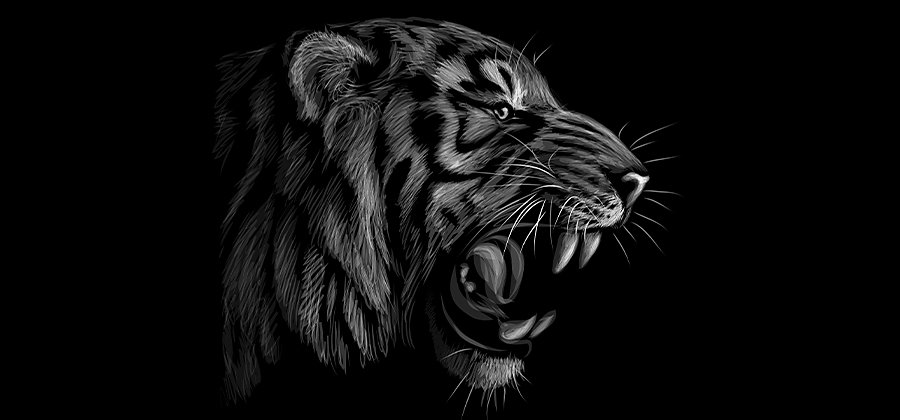
From tiger heads to massive paws.
Tigers are some of the most distinctive-looking cats on the planet. Their size, stripes, and mix of agility and strength have made them a compelling artistic subject for centuries. Tigers today still present an image of strength and speed. They’re one of the most popular mascots for sports teams, and cartoon tigers like Shere Khan and Hobbes loom large in pop culture. This is how to give a tiger its stripes and so much more.
Draw a tiger, step by step.
Tigers look different from other cats because of their stripes, but that’s not all that sets them apart. The biggest, such as Siberian tigers, can weigh in at several hundred pounds. Because they are the largest of the big cats, they tend to have slightly different bodily proportions than other felines. If you use a reference photo of another cat (like a cheetah or even a housecat) and add stripes, you won’t get a drawing that truly captures the essence of a tiger. Even a baby tiger will be stockier than other kittens.
There’s more than one species of tiger. While all of them are large and striped, each type also looks subtly different. Bengal tigers tend to be smaller and deeper orange, and Siberian tigers are especially large and have lighter fur. Make sure you’re using the proper type of reference photo when you begin your drawing of a tiger.
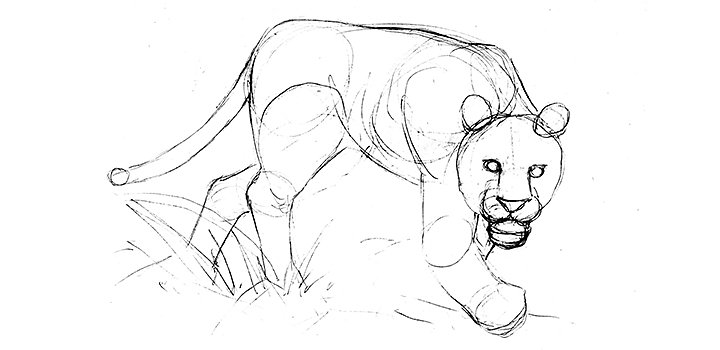
Image by Megan Levens
Tiger torsos and limbs.
Tigers are very graceful and very muscular. “Tigers, like many cats, have a bit of fluidity about them,” says comics and children’s book illustrator Lucas Elliott. “But the great thing about tigers is how much muscle and mass they have.” An artist needs to capture the size and heaviness of a tiger as they capture the litheness and fluidity of this feline subject. When you sketch the initial basic shapes for your tiger drawing, remember to take musculature into account.
That mix of agility and heaviness extends to a tiger’s limbs. “The thing about tigers is that they have massive paws,” says Elliott. A tiger’s paw is big both to support its size and to subdue prey. The paws on the hind and front legs are large in comparison to the limbs, and it’s important to get the proportions right to distinguish a tiger from other cats.
Most tiger illustrations won’t feature all four limbs in the frame. “When you’re drawing things that walk on all fours,” says illustrator Ben House, “you’re usually going to have one leg that is very obscured.” Tigers are dynamic, active creatures, and most of the time, their pose or movement will leave one leg out of view.
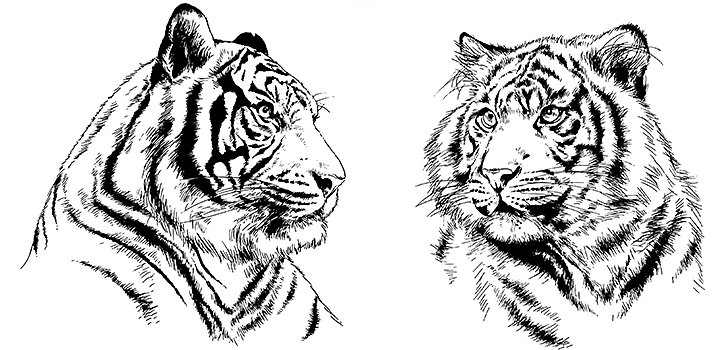
How to draw tiger faces.
Tigers’ size and stockiness relative to other cats isn’t just a feature of their body and limbs. That sense of mass is also present in their head, face, and expressions. “Some cats have a little bump for a jaw,” says Elliott, “but tigers have this big square jaw.” Their mouth, snout, and everything around it is larger than what you’ll find on a housecat or even a smaller wild cat. “On tigers, the nose shape is huge,” says House. “It’s a really big landmark on the face.” Even if you’re just doing a portrait of a tiger’s head, the viewer should still get a sense of the animal’s size. Tigers are big from the toes to the nose.
Keep in mind that the back of a tiger’s head isn’t perfectly flat or perfectly curved. “Most creatures like this have a little bit of a bump in the middle of the head, right between the ears,” says Elliott. That bump is a slight indentation at the crown of the head, where the two curved halves of the skull meet. Keeping that mid-skull indentation can go a long way toward making your drawing look realistic.
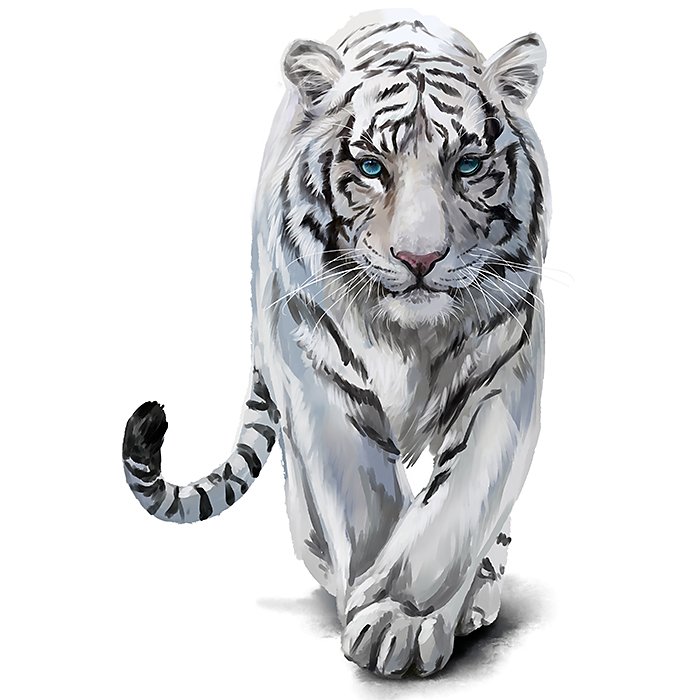
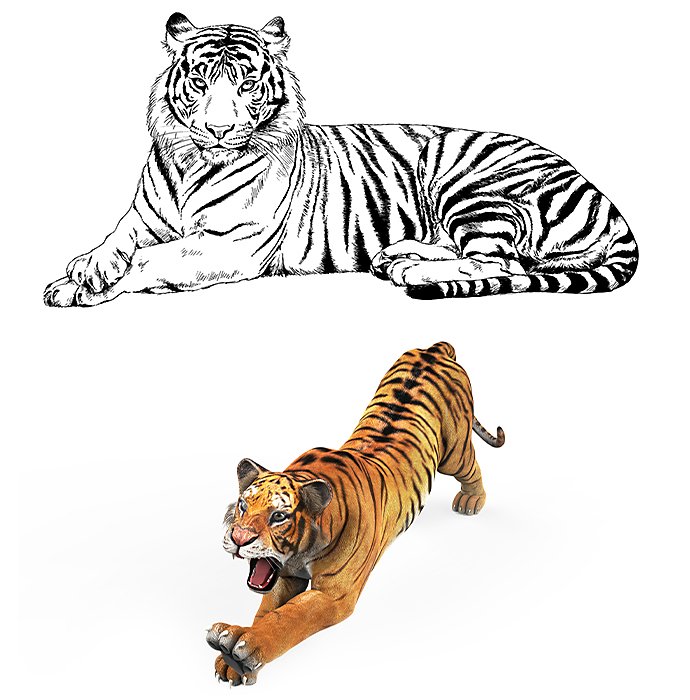
Stripes and shading.
A tiger’s black stripes give it character, definition, and shape. Stripes are another way to give tigers a sense of scale. “Tiger stripes are not only cool looking, they inform the volume of the tiger with their shape,” says House. Stripes should flow and work in concert with each other.
The stripes are also a great opportunity to add variation and visual flair to your drawing. “Having a mixture of heavier lines versus lighter lines creates a nice weight variation and keeps your eye moving,” says Elliott.
Capture that tiger personality.
Perhaps the most important aspect of drawing a tiger is the big cat’s personality. Tigers don’t just sit on rocks and pose for life drawings. They’re usually doing something. “Most of the time they’re going to be slinking around in grass or bamboo,” says House. “They’re kind of sneaky.” Adding in grass or foliage to partially obscure the tiger gives a sense of predatory menace and mystery.
If you’re drawing a cartoon tiger that’s going to express human emotions, then your tiger’s face also needs to be able to communicate those emotions. Tigers have an advantage if you want to draw an animal that talks, as their stripes and fur markings can be used like human facial features. These markings can act like eyebrows, smile lines, furrowed brows, crow’s feet, and more, allowing your cartoon animals to be expressive.
Whatever personality you give your tiger, whether it’s wild and stealthy or human-like, make it fierce. Tigers are 500-pound apex predators that, despite their size and heft, can still stalk undetected through tall grass before pouncing on prey. They do all that while looking fabulous and fearing nothing. Make that personality come through in your tiger drawing. Draw them big. Draw them bold.
Contributors
You might also be interested in…
How to draw a wolf.
Capture the wild spirit of the wolf with these drawing tips.
Learn how to draw horses.
Discover tips to take on the challenge of drawing these big, beautiful creatures.
How to draw birds of any feather.
Learn the basics of drawing birds digitally with this step-by-step tutorial.
Honing your ability to draw faces and heads.
Get tips for drawing better facial features, from realistic portraits to cartoons.



